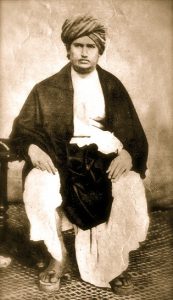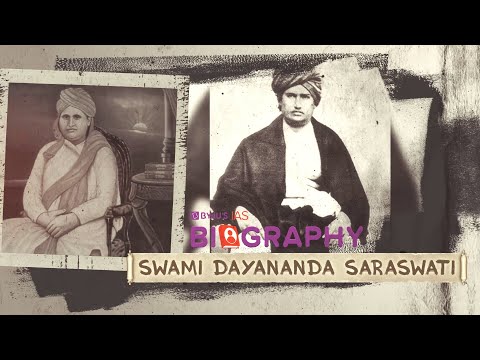See previous ‘This Day in History’ here.
On 12 February 1824, social and religious reformer Swami Dayananda Saraswati was born. He was born at Tankara located in Gujarat. He founded the Arya Samaj on April 7, 1875. This article will share important works and events in the life of Swami Dayanand.
Aspirants would find this article very helpful while preparing for the IAS Exam.
| Aspirants should begin their preparation by solving UPSC Previous Year Question Papers now!!
To complement your preparation for the upcoming exam, check the following links:
|
Biography of Dayananda Saraswati

- Born Mul Shankar Tiwari, Dayananda was a prolific reformer of the Hindu religion.
- He was born into a well-to-do family to a tax collector named Karshanji Lalji Kapadia and his wife Yashodabai.
- He learnt Sanskrit and the Vedas in his childhood.
- He started pondering over the meaning of life after his sister and uncle died. Engaged to be married in his teens, Mul Shankar decided he wanted to lead an ascetic life and ran away from home.
- He spent 25 years as a wandering ascetic and travelled to the Himalayas and other religious places in northern India. He was seeking the truth about life and gave up all material goods in this spiritual pursuit.
- He also started practising Yoga during this time. His teacher in all things spiritual was Virajanand Dandeesha.
- Dayananda understood that Hinduism had strayed away from its roots. He promised his Guru that he would strive hard to reinstate the position of the Vedas to its rightful honoured place in the Hindu religion and way of life.
- He preached against the giving of donations to priests. He also challenged established scholars and won debates against them through the strength of the Vedas. He was staunchly against rituals and superstitions.
- He extolled spiritualism and nationalism and appealed to the people to fight for Swarajya.
- He also exhorted the importance of cows for the prosperity of the nation and encouraged the adoption of Hindi for national integration.
- He stressed on the importance of education of all children and preached respect and equal rights for women.
- He founded the Arya Samaj on April 7, 1875. Through this reform movement, he stressed on One God and rejected idol worship. He also advocated against the extolled position of priests in Hinduism.
- He opposed the multiplicity of castes. Furthermore, he thought that caste multiplicity is the main reason behind the conversion of lower castes into Christianity and Islam.
- He also established Vedic schools for the education of girls and boys of all castes. The students of these schools were given free books, clothing, lodging and food, and were taught the Vedas and other ancient scriptures.
- Arya Samaj led a prolonged movement against untouchability and advocated the dilution of caste distinctions.
- Dayanad anglovedic trust and Management society in lahore in 1886 , was an attempt to unite the samaj and its activities.
- They also worked for the protection of widows and other social work like providing relief to victims of natural or manmade calamities.
- He wrote many books. His major contribution is the Satyartha Prakash. Other books include the Sanskarvidhi, Rigved Bhashyam, etc.
- People he inspired include Shyamji Krishna Varma, MG Ranade, VD Savarkar, Lala Hardyal, Madan Lal Dhingra, Bhagat Singh and many others. He was also admired by Swami Vivekananda, Subhash Chandra Bose, Bipin Chandra Pal, Vallabhbhai Patel, Romain Rolland, etc.
- According to S Radhakrishnan, some reforms included in the Indian Constitution were influenced by Dayananda.
- Dayananda was poisoned during his stay at the palace of the Maharaja of Jodhpur, Jaswant Singh II. He succumbed to the injury suffered at Ajmer, where he was sent for better treatment on 26th October 1883. He was 59.
Candidates can refer to the Previous Year’s History Questions in UPSC Mains GS 1, from the linked article.
Also on this Day
1742: Birth of Nana Phadnavis, a statesman of the Maratha Empire during the Peshwa administration.
1794: Death of Mahadaji Shinde, Maratha ruler of Gwalior, who was instrumental in resurrecting Maratha Empire in northern India.
1871: Birth of Charles Freer Andrews, social reformer and close friend of Mahatma Gandhi.
To learn more about Swami Dayananda Saraswati, aspirants can refer to the video below with the biography of the social and religious reformer, curated by experts for UPSC aspirants:

Multiple Choice Question (MCQ)
Consider the Following Statements
- Some of the major books written by Swami Dayanand were Satyartha Prakash, Sanskarvidhi, Rigved Bhashyam, etc.
- Swami Dayanand stressed on One God and accepted idol worship.
- Savitribai Phule played an important role in improving women’s rights in India. She worked to abolish the discrimination and unfair treatment of people based on caste and gender.
- Swami Dayananda advocated the doctrine of Karma and Reincarnation.
Which of the following statements are true?
A) Only 1, 3 and 4 are true.
B) All the statements are true.
C) Only 1, 2 and 4 are true.
D) None of the Statements is true.
Answer: A
Birth of Dayananda Saraswati – [February 12, 1824]:- Download PDF Here
| Swami Vivekananda |
| Bipin Chandra Pal |
| Raja Ram Mohan Roy |
The above details would help candidates prepare for UPSC 2023.
Comments